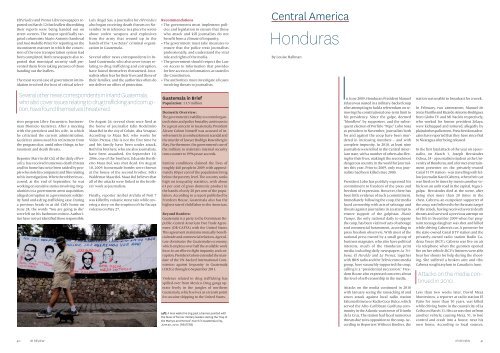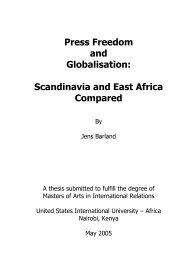FOCUS ON THE AMERICAS - International Press Institute
FOCUS ON THE AMERICAS - International Press Institute
FOCUS ON THE AMERICAS - International Press Institute
Create successful ePaper yourself
Turn your PDF publications into a flip-book with our unique Google optimized e-Paper software.
ElPeriodico and Prensa Libre newspapers reported<br />
on March 12 that leaflets discrediting<br />
their reports were being handed out on<br />
street corners. The mayor specifically targeted<br />
columnists Mario Antonio Sandoval<br />
and José Rodolfo Pérez for reporting on the<br />
inconsistent manner in which the concession<br />
of the new transportation system had<br />
been completed. Both newspapers also reported<br />
that municipal security staff prevented<br />
them from taking pictures of those<br />
handing out the leaflets.<br />
The most recent case of government intimidation<br />
involved the host of critical televi-<br />
sion program Libre Encuentro, businessman<br />
Dionicio Gutiérrez. After a meeting<br />
with the president and his wife, in which<br />
he criticized the current administration,<br />
Gutiérrez announced his retirement from<br />
the program due, amid other things, to harassment<br />
and death threats.<br />
Reporter Marvin del Cid, of the daily elPeriodico,<br />
has received numerous death threats<br />
and his home has twice been raided by people<br />
who stole his computers and files relating<br />
to his investigations. When the robberies occurred,<br />
at the end of September, he was<br />
working on sensitive stories involving irregularities<br />
in a government arms acquisition,<br />
alleged corruption in a government solidarity<br />
fund and a drug-trafficking case. During<br />
a previous break-in at del Cid’s home on<br />
June 24, the words “You are going to die”<br />
were left on his bathroom mirror. Authorities<br />
have not yet identified those responsible.<br />
Luis Ángel Sas, a journalist for elPeriodico<br />
also began receiving death threats on November<br />
16 in reference to a piece he wrote<br />
about stolen weapons and explosives<br />
from the army that wound up in the<br />
hands of the “Los Zetas” criminal organization<br />
in Guatemala.<br />
Several other news correspondents in Inland<br />
Guatemala, who also cover issues relating<br />
to drug trafficking and corruption,<br />
have found themselves threatened. Journalists<br />
often fear for their lives and those of<br />
their families, and the authorities often do<br />
not deliver on offers of protection.<br />
Several other news correspondents in Inland Guatemala,<br />
who also cover issues relating to drug trafficking and corruption,<br />
have found themselves threatened.<br />
On August 26, several shots were fired at<br />
the home of journalist Edin Rodelmiro<br />
Maaz Bol in the city of Cobán, Alta Verapaz.<br />
According to Maaz Bol, who works for<br />
Video Prensa, this is not the first time he<br />
and his family have been under attack.<br />
Both his brothers, who are also journalists,<br />
have been assaulted. On September 10,<br />
2006, one of the brothers, Eduardo Heriberto<br />
Maaz Bol, was shot dead. On August<br />
18, 2009, homemade bombs were thrown<br />
at the house of the second brother, Félix<br />
Waldemar Maaz Bol. Maaz Bol believes that<br />
all of the attacks were linked to the brothers’<br />
work as journalists.<br />
Finally, reporter Aníbal Archila of Noti 7<br />
was killed by volcanic stone rain while covering<br />
a story on the eruption of the Pacaya<br />
volcano on May 27.<br />
Recommendations<br />
• The government must implement policies<br />
and legislation to ensure that those<br />
who attack and kill journalists do not<br />
benefit from a climate of impunity.<br />
• The government must take measures to<br />
ensure that the police treat journalists<br />
professionally, and understand the vital<br />
role and rights of the media.<br />
• The government should respect the Law<br />
on Access to Information that provides<br />
for free access to information, as stated in<br />
the Constitution.<br />
• The authorities must investigate all cases<br />
involving threats to journalists.<br />
Guatemala in Brief<br />
Population: 13.5 million<br />
Domestic Overview:<br />
The government’s inability to control organized<br />
crime and police brutality continues to<br />
be a great concern in Guatemala. President<br />
Álvaro Colom himself was accused of involvement<br />
in an embezzlement scandal and<br />
the murder of lawyer Rodrigo Rosenberg in<br />
May. Furthermore, the government’s use of<br />
the military to maintain internal security<br />
runs counter to 1996 peace accords.<br />
Famine conditions claimed the lives of<br />
roughly 460 people in 2009, with approximately<br />
80 per cent of the population living<br />
below the poverty level. The country ranks<br />
high on inequality statistics, with about<br />
63 per cent of gross domestic product in<br />
the hands of only 20 per cent of the population.<br />
According to a report published by<br />
Freedom House, Guatemala also has the<br />
highest rate of child labor in the Americas.<br />
Beyond Borders:<br />
Guatemala is a party to the Dominican Republic-Central<br />
American Free Trade Agreement<br />
(DR-CAFTA) with the United States.<br />
This agreement maintains mutually beneficial<br />
trade and commercial relations. Agriculture<br />
dominates the Guatemalan economy,<br />
which employs over half the available work<br />
force. In an effort to fight impunity and corruption,<br />
President Colom extended the mandate<br />
of the UN-backed <strong>International</strong> Commission<br />
against Impunity in Guatemala<br />
(CICIG) through to September 2011.<br />
Violence related to drug trafficking has<br />
spilled over from Mexico. Drug gangs operate<br />
freely in the jungles of northern<br />
Guatemala, which serves as a transit point<br />
for cocaine shipping to the United States.<br />
Left: A man walks his dog past a banner painted with<br />
the faces of former military leaders during the "Day of<br />
the Martyrs and Heroes" march in Guatemala City,<br />
June 30, 2010. (REUTERS)<br />
Central America<br />
Honduras<br />
By Louise Hallman<br />
In June 2009, Honduran President Manuel<br />
Zelaya was ousted in a military-backed coup<br />
after attempting to hold a referendum on removing<br />
the constitutional one-term limit to<br />
his presidency. Since the golpe, deemed<br />
“bloodless” by supporters, and the subsequent<br />
election of Porfirio “Pepe” Lobo Sosa<br />
as president in November, journalists both<br />
for and against the coup have been murdered<br />
in increasing numbers – and with<br />
complete impunity. In 2010, at least nine<br />
journalists were killed in the Central American<br />
state, with a number of others also fleeing<br />
for their lives, making it the second most<br />
dangerous country in the world for journalists<br />
this year. Prior to 2009, only two journalists<br />
had been killed since 2000.<br />
President Lobo has publicly expressed his<br />
commitment to freedom of the press and<br />
freedom of expression. However, there has<br />
been little evidence of such a commitment.<br />
Immediately following the coup, the media<br />
faced censorship with acts of sabotage and<br />
threats against journalists in an attempt to<br />
ensure support of the golpistas. Diario<br />
Tiempo, the only national daily to oppose<br />
the coup, has been victim of acts of sabotage<br />
and commercial harassment, according to<br />
press freedom observers. With most of the<br />
national press owned by a small group of<br />
business magnates, who also have political<br />
interests, much of the Honduran print<br />
media, including daily newspapers La Tribuna,<br />
El Heraldo and La Prensa, together<br />
with HRN radio and the Televicentro media<br />
group, have staunchly supported the coup,<br />
calling it a “presidential succession.” Freedom<br />
House also expressed concerns about<br />
the level of self-censorship in the media.<br />
Attacks on the media continued in 2010<br />
with January seeing the ransacking of and<br />
arson attack against local radio station<br />
Faluma Bimetu or Radio Coco Dulce, which<br />
A man walks his dog past a banner painted with the<br />
faces<br />
served<br />
of former<br />
the<br />
military<br />
Afro-Caribbean<br />
leaders during the<br />
Garifuna<br />
"Day of the<br />
com-<br />
Martyrs munity and Heroes" in the march Atlantic-coast in Guatemala town City June of Triunfo<br />
30, 2010. de la The Cruz. march The is held station every had year faced in protest numerous of<br />
the official threats Military due to Day its celebrations. opposition to the coup. According<br />
to Reporters Without Borders, the<br />
station was unable to broadcast for a week.<br />
In February, two cameramen, Manuel de<br />
Jesús Murillo and Ricardo Antonio Rodríguez<br />
from Globo TV and Mi Nación respectively,<br />
who worked for former president Zelaya,<br />
were kidnapped and tortured, allegedly by<br />
plainclothes policemen. <strong>Press</strong> freedom advocates<br />
have reported that they have since fled<br />
to Nicaragua after being released.<br />
In the first fatal attack of the year on a journalist,<br />
on March 1, Joseph Hernández<br />
Ochoa, 24 - a journalism student at the University<br />
of Honduras, and a former entertainment<br />
presenter on the privately-owned<br />
Canal 51 TV station - was travelling with fellow<br />
journalist Karol Cabrera, when their car<br />
was fired on 36 times by men in another vehicle<br />
on an unlit road in the capital, Tegucigalpa.<br />
Hernández died at the scene, after<br />
being shot more than 20 times in the<br />
chest. Cabrera, an outspoken supporter of<br />
the coup, was believed to be the main target<br />
of the attack, having received several death<br />
threats and survived a previous attempt on<br />
her life in December 2009 when her pregnant<br />
teenage daughter was shot and killed<br />
while driving Cabrera’s car. A presenter for<br />
the state-owned Canal 8 TV station and the<br />
privately-owned radio station Radio Cadena<br />
Voces (RCV), Cabrera was live on air<br />
via telephone when the gunmen opened<br />
fire on her vehicle. RCV’s listeners were able<br />
hear her shouts for help during the shooting.<br />
She suffered a broken arm and ribs.<br />
Cabrera sought asylum in Canada in June.<br />
Attacks on the media continued<br />
in 2010.<br />
Less than two weeks later, David Meza<br />
Montesinos, a reporter at radio station El<br />
Patio for more than 30 years, was killed<br />
while driving home in the coastal city of La<br />
Ceiba on March 11. His car was shot at from<br />
another vehicle, causing Meza, 51, to lose<br />
control and crash into a house, near his<br />
own home. According to local sources,<br />
40 IPI REVIEW<br />
IPI REVIEW 41

















